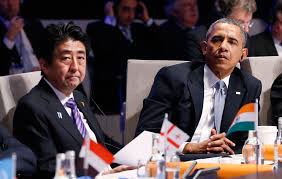Obama travels to Asia to underscore the U.S. commitment to the region
Wednesday, April 23rd, 2014 1:29:41 by Kashif Mirza
Almost three years after the White House announced its intention to focus its foreign policy on Asia, U.S. President Barack Obama embarks Tuesday on a tour that will take him to Japan, South Korea, Malaysia and the Philippines the task of convincing its Asian partners that the region remains a priority despite Ukraine now or Iran and Syria in recent months have forced his administration to divert attention from the Pacific. The president will try to push trade agreements and commitments on security with its allies in the region in an effort to temper their misgivings about Beijing ‘s expansionist ambitions, which could be strengthened by the aggressiveness shown by Russia – Ukraine crisis without raising the suspicions of the Chinese Government, whose complicity is becoming increasingly necessary to counter Washington away from Moscow.
Initially, the White House had raised the trip as an opportunity to bolster the diplomatic, economic and military shift to the Pacific, especially after the cancellation of the tour scheduled for October last year due to the closure of the Administration. Since then, the transfer of troops and military resources to the region has been diminished due to drastic budget cuts to the Pentagon and the ease with which Russia annexed faces Crimea have grown among Asian U.S. allies suspicions that Beijing can trace Moscow’s attitude in its territorial claims in the South China Sea and that Washington is able to contain the economic and military influence in the Asian giant. ” The president must persuade the public that their commitment to Asia is serious, that we will not do in Europe at the expense of doing less in Asia,” said Richard Haass, president of Council on Foreign Relations.
The U.S. administration has described this Obama trip- fifth that performs a region – as crucial for the future of the country. ” Our top priorities are linked to Asia, whether in terms of access to new markets, promote exports or to protect our security interests,” he said last Friday the National Security Advisor of the President, Susan Rice. One of the cornerstones of this shift is the Strategic Agreement Trans- Pacific Partnership (TPP, its acronym in English), one of the most ambitious process of trade integration that is currently being negotiated, which includes liberalizing economies of the countries in the Asia Pacific region and, if carried out, would consolidate 40% of world GDP.
The Obama Administration sought to be finalized later this year TPP, but the reluctance in Congress – in particular, that the Democrats themselves have not asked the president to expedite the process in order to save his re-election in November, and disagreements Japan in terms of the conditions of access to agricultural and automotive markets have forced the U.S. government to lower expectations. Thursday’s meeting with the Japanese Prime Minister Shinzo Abe, will be one of the most momentous events of the tour of the U.S. president. Addition of TPP- where progress but no definitive solutions -Obama should address the nationalist shift that has imposed the Japanese representative to the country, very different from its predecessors were accustomed to his Washington policy – and that has created tensions with the expected other main partner in the Washington region, South Korea – since Abe and the Korean president, Park Geun- hye came to power a year ago have not held any meetings.
China is not within the itinerary of Obama, but his shadow will be present throughout your visit. The dispute between Tokyo and Beijing over the unilateral redefinition of China’s air defense zone remains unresolved, although the U.S. has deemed illegal, the Philippines has increased their claims on Scarborough Reef. So far, Washington has chosen not to take sides in all territorial disputes over the South China Sea not to rouse the Beijing authorities. The President, however, is expected to announce the renewal of its military presence in the Philippine archipelago country, in a gesture that the Administration want to present as a revalidation Post shipping, in 2011, 2,500 Marines to Australia, which was considered as the symbol of the new U.S. alliance with Asia.
The cuts in the Defense Department, however, have prevented the Administration to meet its military commitments to the region only 1,500 marines have arrived in Australia, and the naval and air fleet intended for the area is becoming obsolete, increasing misgivings of the Asian countries on the extent of U.S. commitment to Asia and its ability to halt when potential Chinese aggression. The Pentagon chief, Chuck Hagel, however, stresses the importance of the region. In his meeting with the Member States of the Association of Southeast Asian Nations in Hawaii last month, made ??clear that ” despite the budget cuts, the Pacific is our priority.”
“They are concerned about the resources that they will be transformed to meet this shift, financial and military, but especially the attention of lawmakers in Washington,” state from the Woodrow Wilson Center. The Congress believes that, for now, the White House has failed in its strategy approach to Asia, according to a report published by the Foreign Relations Committee of the Senate. ” Despite progress in some areas, implementation has been uneven rebalancing diplomat,” said its president, Democrat Bob Menendez. The Obama Administration is more optimistic. “I have not perceived anxiety, in fact I think we are going to the area just at the time when our allies are much more engaged with us,” Rice said.
Short URL: https://www.newspakistan.pk/?p=43169

















